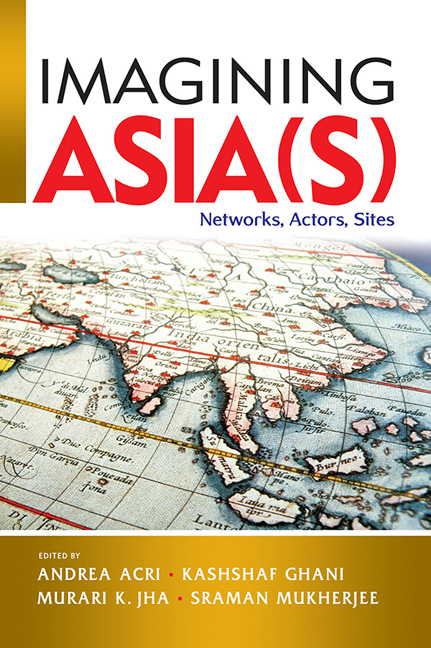Book contents
- Frontmatter
- Contents
- List of Contributors
- Introduction
- Part I Conceptualizing the Region: Past and Present
- Part II Conceptualizing Asia through the Prism of Europe
- Part III Networks of Knowledge Across the Indian Ocean
- 6 An Indian Ocean Ribā?: War and Religion in Sixteenth-Century Ponnāni, Malabar Coast
- 7 Travelling Spirits: Revisiting Melaka's Keramat from the Indian Ocean
- Part IV Histories and Geographies of Pilgrimage in Asia
- Part V Trans-Local Dynamics and Intra-Asian Connections across Space and Time
- Index
6 - An Indian Ocean Ribā?: War and Religion in Sixteenth-Century Ponnāni, Malabar Coast
from Part III - Networks of Knowledge Across the Indian Ocean
Published online by Cambridge University Press: 31 January 2020
- Frontmatter
- Contents
- List of Contributors
- Introduction
- Part I Conceptualizing the Region: Past and Present
- Part II Conceptualizing Asia through the Prism of Europe
- Part III Networks of Knowledge Across the Indian Ocean
- 6 An Indian Ocean Ribā?: War and Religion in Sixteenth-Century Ponnāni, Malabar Coast
- 7 Travelling Spirits: Revisiting Melaka's Keramat from the Indian Ocean
- Part IV Histories and Geographies of Pilgrimage in Asia
- Part V Trans-Local Dynamics and Intra-Asian Connections across Space and Time
- Index
Summary
INTRODUCTION
“I encourage you for ribāṭ. […] Two eyes will never be touched by the fire of Hell: an eye which weeps out of fear of the omnipotent God and an eye which spends the night in guarding in the Cause of God against the infidels,” says Qāḍī Muḥammad al-Kālikūtī in a war-speech written around 1570 to incite his audience against the Portuguese intruders into the Malabar Coast in southwest India. This passage catches our attention for its use of the concept of ribāṭ—an unusual term in the socio-cultural context of the battles between the European and Asian powers in the waters of Indian Ocean.
This chapter is an attempt to examine the micro-level, socio-cultural setting of a region in the Malabar Coast in the sixteenth century (and its entanglements in the broader predicaments of the Indian Ocean world), at the time of wars between the Portuguese and the local rulers, the Zamorins, along with their Muslim supporters. The Muslim involvement in the anti-Portuguese wars was not inadvertent; rather, it was part of a larger web of commercial and religious interests, traditions, and histories. The Muslims in Malabar did have personal motivations to wage war, but so did the Zamorins, the Portuguese, the Mamlūks, and the Ottomans to collaborate with or counter one another in the maritime littoral. The existing conceptualizations of these battles have ignored the ways in which the local communities perceived and framed their military engagements in terms of a wider worldview and praxis. This chapter enquires such indigenous justifications and conceptualizations by looking at their own writings, and it suggests that the local Muslims ratiocinated their geo-political spheres in terms of ribāṭ, a concept of coastal guardianship rooted in Islamic vocabulary of war and peace.
In the last four decades, several historians have suggested various models to understand the political spectra in which the Muslims of Malabar or of broader South Asia had existed and operated. In a broader South Asian context, they have conceptualized the frontier zones in different ways (Eaton 1978; Gommans 2002; Green 2012; Hasan 2004; Ernst 2009). Although their studies inform my discussion, one should bear in mind that their analysis is grounded on a Delhi/Mughal-centrism, for they focus on the idea that a particular “space” becomes a frontier thanks to its being peripheral to an imperial centre.
- Type
- Chapter
- Information
- Imagining Asia(s)Networks, Actors, Sites, pp. 147 - 174Publisher: ISEAS–Yusof Ishak InstitutePrint publication year: 2019



